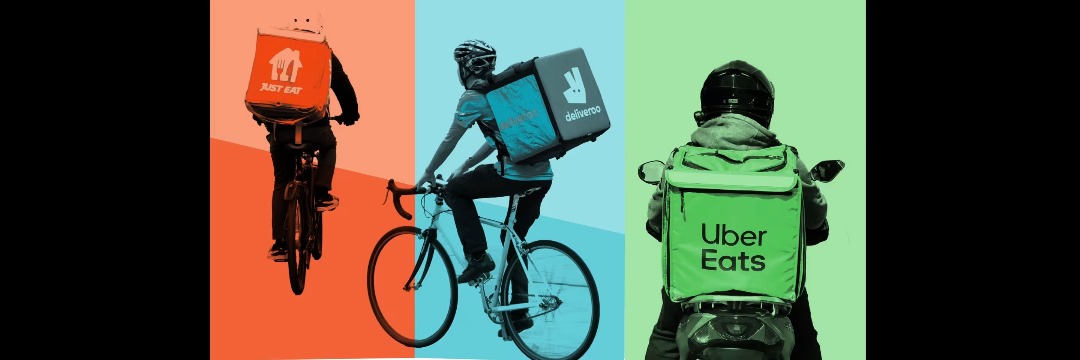“If anyone is struggling with renting an Uber Eats account due to selfie verification, I can put you in contact with a guy who will be able to sort it. It will cost, though.” The post, one of dozens a day on the Facebook page “Food Delivery Drivers Uber Eat & Deliveroo UK”, is an example of how checks by the food delivery industry to ensure its riders have a legal right to work in Britain are being targeted by those looking to circumvent them. Ministers on Tuesday set out a new partnership with Deliveroo, Just Eat Takeaway and Uber Eats — the three main companies — to curb illegal working in the sector, which has become a key source of income for newly arrived migrants. The government’s move to share data on the location of asylum hotels with delivery companies comes after concerns that undocumented migrants have increasingly been drawn to the industry, which has few language requirements and offers limited competition from UK workers. The government is stepping up raids on riders’ gathering points and bolstering existing measures to suspend those who rent out legitimate accounts with companies to substitutes who do not have the right to work, as it seeks to prove to international partners that it will not let an unregulated labour market become a “pull factor” for irregular migration via the English Channel. Deliveroo and its rivals have come under similar scrutiny across their European operations in recent years, after undocumented migrants were found to be borrowing or renting accounts from riders to work illegally. The difference in the UK, however, is that the practice of riders renting out accounts to substitutes — frowned on elsewhere — is an important part of the companies’ business model. A clause inserted into riders’ contracts by Deliveroo in 2017 gave the workers a “virtually unfettered” right to appoint a substitute — as the UK Supreme Court termed it — and has enabled the company to fend off legal challenges to its claim that its couriers are self-employed. Were they to be classified as workers or employees, they would qualify for benefits such as pension enrolment. Although barely used at first, the clause now underpins a thriving secondary market in which riders sell access to accounts they are not using for fees of between £50 and £120 a week, with “premium” accounts from riders with a good record commanding higher prices. For migrants with insecure or irregular legal status, the food delivery sector “represents one of the few viable options for earning a livelihood”, researchers at the University of Birmingham said in a paper this month. For many, the informal use of shared or rented accounts was “not a legal loophole but a survival mechanism”, they added. Private groups on Facebook and other websites have drawn thousands of members, with recent posts seen by the Financial Times showing some riders seeking to rent an account when their own had been deactivated — and others seeking help to bypass right-to-work checks. “I am looking for a Just Eat account in Sheffield . . . [I have] no work permit,” read one post in the past few days. “Just Eat account for rent — £77 per week,” read another. James Farrar, founder of Worker Info Exchange, a campaign group that supports gig workers, said that by delaying plans to legislate on workers’ status, the government was “in a position where it is really facilitating these companies in evading employment law”. Food delivery companies also benefited from the ability to “tap a vulnerable workforce . . . who are not going to come forward or complain”, he added, allowing them to hold down fares that would otherwise need to rise to attract the riders needed to meet demand. Deliveroo and Uber Eats have negotiated minimum fees for their riders, which are reviewed each year, according to people familiar with the companies’ thinking. Over the past year, the companies have also stepped up measures such as mandatory substitute registration, right to work checks and facial recognition scans for riders. Since introducing checks, Deliveroo has blocked hundreds of accounts and prevented the registration of thousands of users, said a person close to the company. However, obligations for employers to conduct right-to-work checks do not cover self-employment at present, so there are no financial penalties if riders find ways around them. One rider on London’s Brick Lane told the FT facial scans by Just Eat Takeaway often took place only once or twice a week, compared with daily scans by Deliveroo and Uber Eats. Just Eat Takeaway said couriers were “randomly prompted to complete a facial recognition check” and that anyone who failed the tests was “removed from the JET network”. The company added that it welcomed an announcement from the Home Office last month alongside the industry’s three main players, whereby the companies agreed to step up measures, including increased use of facial verification checks and fraud detection technology within the next 90 days, in an effort to tackle the problem. Just Eat Takeaway will increase its checks from monthly to daily as a result of the agreement, while Deliveroo will increase its checks to multiple times a day, according to people familiar with the company’s thinking. Deliveroo said it had “led the sector” in “introducing security measures to prevent illegal working on our platform”, and that it would continue to strengthen controls to combat new evasion schemes. Meanwhile, Uber Eats said it was “constantly reviewing” its tools and “finding new ways to crack down on people who are trying to work illegally”. The company said it had introduced “state-of-the-art identity and document video verification technology” to tackle the groups behind the exploitation of undocumented migrants — often organised crime gangs — and that offenders’ accounts were immediately blocked. The Home Office said it would “not stand for illegal working” and pointed to plans to extend the right to work checks to the self-employed and boost enforcement action. Meanwhile, on Wednesday, the Foreign, Commonwealth and Development Office announced the first sanctions on people smugglers, under a new regime aimed at “individuals and entities . . . driving irregular migration to the UK”. Among the first 25 targets were Balkan and North African gang leaders hit with travel bans and asset freezes. But while the clampdown will undoubtedly make it harder for irregular migrants to work through the big gig platforms, analysts said it risked pushing them into even more shadowy corners of the labour market without deterring cross-Channel flows. “Performative ‘clampdowns’ and punitive restrictions on work all contribute to the weakening of the asylum protection system for those who need it most and the erosion of employment law for all of us,” said Farrar. “These actions place already vulnerable people at even greater risk.”
‘Account for rent’: UK seeks to curb illegal work in food delivery sector
Delphine Strauss and Kieran Smith

Similar blog posts
View more blog posts
Scotland's International Education Strategy
Scotland welcomes international students, staff, and researchers, recognising the important and valuable contribution they make to the Scottish economy
View blog post
Wage growth slows as UK job market begins to stall
Wage growth slowed again in the UK jobs market but is still outpacing price rises, official figures show.
View blog post
A manifesto for the future
On 30 January, the National Union of Students launched our Manifesto for our Future which represents the aspirations of the millions of students
View blog post